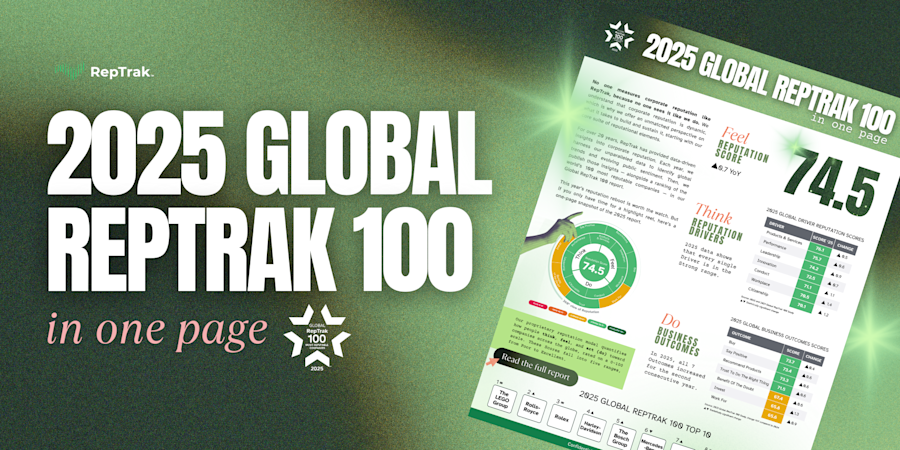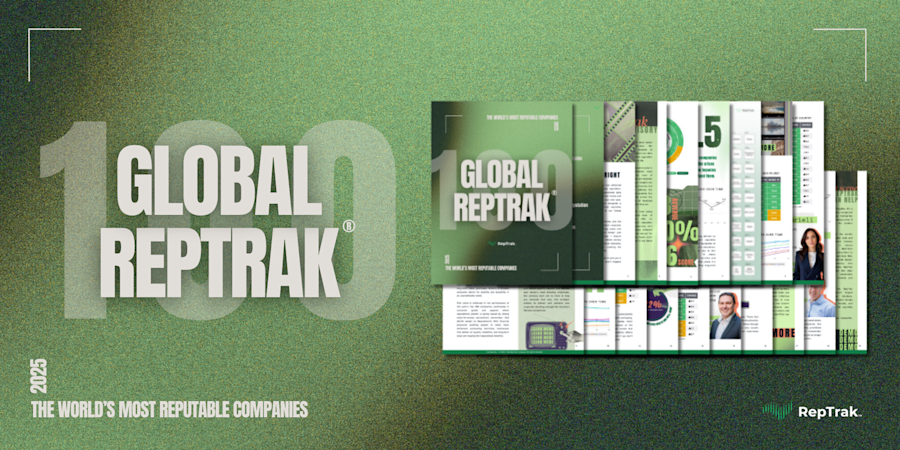COVID-19 in the United States: Consumer Concern about Jobs, Food, and Financial Security on the Rise
Blog Post20 Apr, 2020
While some parts of the United States are starting to show signs of a peak, the spread of COVID-19 continues across the country, with the death toll continuing to rise and many states extending their stay-at-home orders into May. As in many other countries around the world, this coronavirus pandemic will not be ending anytime soon, even as the seasons change and summer starts to appear on the horizon.
With that in mind, The RepTrak Company returned to the field in mid-April to conduct a second study of the U.S. general public, to understand how feelings about the crisis are evolving and learn what the impact on corporate reputation might be. While our survey approach thus far has been localized—zooming in on the point of view of consumers living in Italy, Spain, and the United States—the implications and lessons for corporate leaders are global in nature.
The first wave of results from the United States, fielded between March 13–14, highlighted the general public’s concern about healthcare access and opinion that large corporations and the government should both be working to help the situation. In addition, as in our Italian study, a key theme in the first wave of U.S. research reiterated the point that companies will be judged by how they treat their employees.
Nearly a month later (April 10–12, with 360 respondents), the scenario has become darker and more urgent. At this point, only 10% of respondents believe concern around the pandemic is overblown. At the same time, pessimism about the situation is on the rise.
As the crisis continues to unfold, there are new implications for the role of CEOs. At the same time, key themes have emerged, with clear direction about how the general public wants—and expects—corporations to act right now.
Here are the key findings from our new research:
Part-time workers perceive the highest financial risk. While the notion of an impending economic crisis is generalized across the population, part-time workers almost unanimously believe that COVID-19 will put them at financial risk (87%).
Concerns have shifted from healthcare to even more immediate, basic needs. In a list of key life aspects that can be impacted by COVID-19, food security and job security have climbed to the top, while access to healthcare—particularly relevant in wave one—has fallen to the bottom of the list.
Getting back to normal will take a while. Even if the pandemic’s severity was to decline in the short-term, only 34% of respondents say they would be strongly inclined to shop in brick-and-mortar locations again—especially for nonessential items. Even fewer people (26%) say they would dine out in a restaurant or travel domestically.
Telecom and pharma lead in perceived positive impact during the COVID-19 pandemic. Though they share a history as reputationally challenged industries, telecom and pharma are two sectors that stand out among those that are having the most positive impact during the COVID-19 pandemic.
Corporations can tell their own story, but it’s just as effective to let employees serve as corporate ambassadors. Owned channels like a website, customer support, and email marketing are the channels the general public point to to communicate with consumers about COVID-19 initiatives. But letting employees serve as corporate ambassadors and share company information on their own can be equally well received by consumers.
CEO communications should prioritize the workplace. Providing paid time off to all employees and providing updates about the stability and safety of the workplace should be a CEO’s priority, according to respondents. Less than half of respondents are looking for CEOs to donate personal funds to COVID-19 relief efforts.
From our two study waves, we have identified 7 key takeaways:
1. Concerns have shifted to food and job security
The first wave of results in the U.S. showed access to healthcare as a key concern for the American public. But as unemployment claims rise to historic highs and the availability of food becomes a dominant topic in the media, consumer views of how COVID-19 will affect their lives have changed. This month, job security and food security, along with travel and mobility, are the areas most top of mind for consumers, with respondents expressing concern about how the crisis will affect their ability to work and feed their families.
2. People are reluctant to go back to normal
More than 97% of the U.S. population is currently under a stay-at-home or shelter-in-place order, and the timeline for reopening the country differs by state. And yet, while the ability to test for the virus is increasing and governors are beginning to make plans to lift restrictions, consumer confidence might take longer to reactivate.
When asked about their willingness to return to old habits, data from our second wave of research in the U.S. suggests that people will be slow to go back to normal. More than three quarters of respondents (77%) strongly believe that they will continue only making essential purchases when the crisis reduces in severity, and only 34% plan on doing so in brick-and-mortar locations. Given the concern about an impending financial crisis, just 30% predict they will be making nonessential purchases when the situation improves, and less than 26% plan to dine out or travel domestically when things get better. Fear and economic uncertainty will almost certainly have a long-term impact on consumer behavior, continuing to affect industries most damaged by COVID-19 far beyond the duration of the health crisis.
3. Typically reputationally challenged sectors like telecom and pharma lead in positive impact during COVID-19
In our first wave of survey results, we reviewed the industries most at risk in the eyes of the general public. These included hospitality, transportation, and, especially, airlines. This time around, we asked people about the industries that are having the most positive impact on the crisis. We found that private healthcare providers, pharmaceutical companies, consumer products, food & beverage, technology, and telecommunications are viewed as the sectors that are playing the most positive role during the COVID-19 crisis, according to customers, employees, and community members.
While it is too soon to determine the long-term impact of these responses, we might begin to see a shift in the reputational landscape for these companies in the U.S., since telecom and pharma have historically been among the least reputable industries. Up until February 2020, immediately before the crisis, data from our latest U.S. RepTrak study shows that while an industry like food & beverage had a strong Reputation Score of 73 out of 100, telecom and pharma landed more than 10 points behind, in the low 60s. Stepping up and doing the right thing during this crisis might be an opportunity for lagging sectors to break free from historically negative biases.
4. Consumers want information from companies, yet the new economic landscape has sparked a renewed desire for customer deals
In our first wave of research, we found that a majority of consumers expect companies to educate their employees, suppliers, customers, and communities about the coronavirus and its implications. Providing discounts to customers during the COVID-19 crisis was considerably less of a priority in mid-March—only 44% believed companies should be doing this.
However, over the month that separates our two waves of research, the most significant shift around corporate initiatives took place around the topic of discounts and deals. As more Americans began to experience changes in their monthly incomes, 55% of survey respondents now agree that companies should provide discounts to customers. (A month ago, only 44% of respondents said companies should provide discounts.) The general trend we are observing is that as the crisis increases, so has the demand for companies to provide a plethora of resources—whether this includes education or assistance with personal expenses.
5. The most favorable companies right now are giving back to their customers and communities
Amazon and Walmart continue to be the most polarizing companies in terms of their reactions to the COVID-19 crisis. Some respondents highlighted these businesses’ ability to continue operations, hire new employees, and guarantee the safety of consumers, while others question the legitimacy of their commitment to vulnerable employees.
Among other corporations that stand out for individual COVID-19 responses, companies that have transformed their production to provide healthcare equipment are frequently cited, along with local grocery stores that provide essential produce safely. Specifically, companies like Allstate, State Farm, and USAA were among the most recognized for reacting to their customers’ new reality, and deciding to provide refunds for people staying at home.
6. Companies can leverage the voice of their employees to tell their story
Nearly three quarters of the public (72%) says companies should communicate their COVID-19 response through their own website. The next most preferred communications venue, according to survey respondents, is the people directly working for that company—not branded social media, traditional advertising, or email marketing. Sixty-three percent of respondents say corporations should enable their employees and their customer support services to communicate the company’s crisis management and relief initiatives. During a global pandemic, when people are looking for companies to show more of a human touch, companies should leverage the potential of using employees as ambassadors and educators.
7. CEOs should communicate a corporation’s commitment to their workplace
By now, the CEOs of most companies have made public statements in response to the crisis, either via direct emails to consumers, messages posted publicly on the company’s website or LinkedIn page, or via large, personal donations. They are mostly on the right track—62% of the American public believes that CEOs should be helping the federal government in its COVID-19 relief efforts.
However, what the public really wants is for CEOs to be vocal about their company’s commitment to employees. Following our model of seven reputation drivers, what the general public expects from CEOs is communication relating to the Workplace, Citizenship, and Governance. In a nutshell, the public wants to listen to CEOs’ commitment and observe transparency around doing the right thing for their employees and communities.
Less than half of survey respondents believe CEOs should be addressing financial performance at this time, despite the imminent risk of a recession, and a smaller proportion expect CEOs to donate personal funds to COVID-19. While transferring part of their capital to help the crisis does not hurt a CEO’s reputation, research from our second wave in the U.S. indicates that doing the right thing as an employer and a community member is more important right now. As highlighted by our CEO RepTrak study, CEOs who solely focus on their personal brand at the expense of the company pose a reputational risk for the corporation they are meant to represent.
Focus on what the public needs
In conclusion, the American public will continue looking at corporations as a source of education, aid, and support during this continuing crisis. The most basic sources of security, like food and employment, have been placed at greater risk during a pandemic that is also testing the limits of our health system.
While managing these hard times, corporations should be sensitive to the needs of their customers and the most vulnerable employees. Leadership will be well received when it is targeting the topics that are most essential to the American public—such as employment, safety, and their own financial stability.
Sue Tobias Vice President, Market Leader, North America The RepTrak Company
Brian Slivnick Senior Manager The RepTrak Company
Julie Guerette Senior Manager The RepTrak Company





